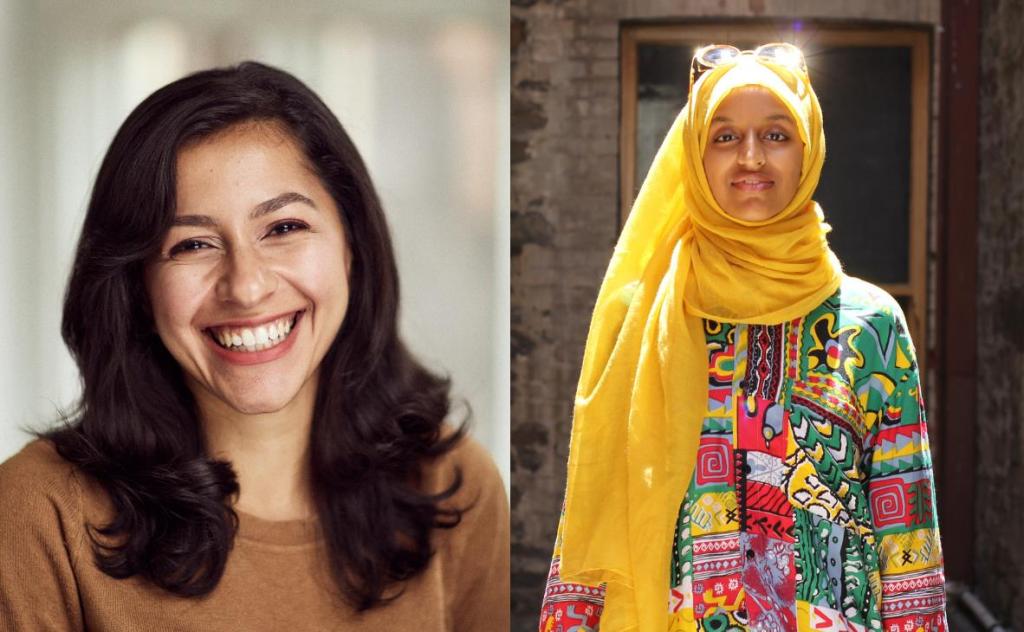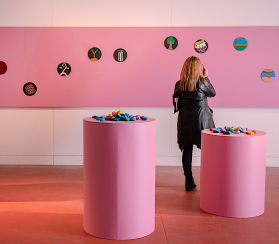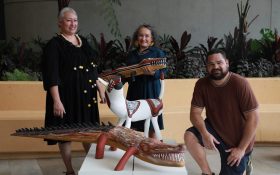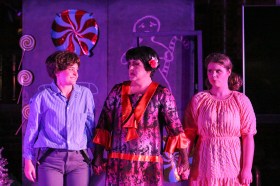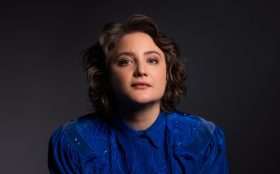‘Oi terrorist, stop trying to make our school sharia!’
The play Jumu’ah (Friday Prayers) begins as it intends to go on – it doesn’t flinch from the reality of Muslim families living in Australia today. But it tells the story like you may not have heard it before, from the perspective of three young people – Layla, Musa and Fatimah. Written by two Muslim women, and directed by another, Jumu’ah speaks in the genuine voices of its cast and creators and is anchored to the complex lived realities of their families. A brave, unexpectedly hopeful production from ActNow Theatre, it is representative of the increasingly diverse face of South Australian theatre.
Jumu’ah premiered at the DreamBig Festival this month, in a format designed to allow young people to speak directly to their peers. It builds on the work ActNow Theatre has become well-known for – energetic forum theatre paired with workshops which allow for a form of socially conscious theatre and democratic story-telling. The company is the only one of its kind in South Australia to adopt this approach, directly grappling with some of the most contentious and charged issues in the country and doing it in our schools and workplaces, where arguably we could use a few more frank conversations.
The play doesn’t offer much in the way of context or familial histories. Instead, we meet Layla, Musa and Fatimah on their own terms: Layla struggles with her identity and to relate to her peers; Musa, athletic and popular, has his own challenges to navigate and Fatimah, well Fatimah is luminous. Young, thoughtlessly brave, effortlessly outspoken, she claims space in a way her siblings do not. Just in their being, the trio challenge notions of a homogenous Muslim identity, demonstrating that there are as many ways to be Muslim in this world as there are Muslims.
‘Within the family we meet in the play, everyone has very different connections to Islam and their history with it. We really wanted to represent the diversity of people who call themselves Muslims,’ says ActNow’s Co-CEO and Artistic Director, Yasmin Gurreeboo.
‘Stereotyping is easy, so we wanted our audience to walk away recognizing that this is not a homogenous clump of people we’re talking about but very different individuals who practice and observe, or who perhaps just like some of the ideas of Islam or value the cultural traditions that are passed down. There is such richness here, like in all other religions.’
Long before the script was finalised, Gurreeboo and the team conducted many hours of consultation with Australian Muslims, including the Muslim Women’s Association of South Australia, MYSA (Multicutural Youth South Australia), the Bosnian community and members of the Marion Mosque as well as with partners such as the Centre for Islamic Thought and Education. The workshop that follows the production was developed through extensive testing and development in local schools. This process, which is ongoing, enriched the production in profound ways.
Michaela Moors, a teacher at Adelaide High School appreciates how it allows for vital conversations. ‘It’s very eye opening in that way. It’s a very welcoming space for everyone to have a discussion – our students knew they could ask questions without offending anyone, and to ask things they thought might be taboo in normal society. It felt like a very safe space,’ according to Moors.
‘We really wanted to represent the diversity of people who call themselves Muslims.’
– Yasmin Gurreeboo
Lur Alghurabi, who wrote the piece with Manal Younus and makes her debut as a playwright with Jumu’ah, couldn’t be happier the production will continue to tour schools after DreamBig.
‘What excited me about it was that I was given an opportunity to speak to myself when I was younger,’ said Alghurabi. ‘I realised how much hunger I had for owned voices, for stories that were told by us and for us.’
Growing up as a migrant, Alghurabi says she never saw teenagers who looked like her explore questions of identity on screen or on the stage. To write her characters, she drew on her memories of her own siblings and cousins as kids – she remembers them as being colourful and autonomous characters, unafraid of contradictions.
‘We were children with a lot of depth, and that wasn’t something I saw in migrant stories. Instead, there was a flat narrative around migrant families where they’re expected to fit into certain boxes and they didn’t get to have choices about who they wanted to be.’
Alghurabi took joy in ditching the stereotypes for Jumu’ah. ‘We don’t go into why they became migrants; we don’t go into their parents at all. It was really fun to create characters that are as wild and free as they thought they were. They are hopeful, just kids, really.’
This playful energy is reflected in the production, where Gurreeboo was inspired to adopt a stripped down, dynamic format that relies on physical theatre, movement and mime. Immersed in this signature style when she was herself a student at the Jacques Lecoq International Theatre School in Paris, Gurreeboo knew it would set the tone for Jumu’ah, and draw audiences in.
As a result, the actors work within a tight square, using the beat (and the music designed by Nelya Valamanesh) to segue into each new scene, moving fluidly between roles, using their bodies to create context and frame the scene.
Rami Saaid who first worked on an iteration of Jumu’ah in 2019, is excited by how the performance has evolved in the run up to its debut. ‘I owe a big hand to Yasmin for pushing it in that direction. It’s interesting because it’s really opened my eyes to what theatre can be,’ he says, explaining that the need to switch between roles, and even recreate objects such as a television camera, a bench or a car with just their bodies was a real challenge. ‘The physicality of this production is different. It was fascinating to see how the human body can be used to represent such diversity.’
But Saaid is perhaps most proud not of his performance but of the tangible representation the role offers, not just for his community, but for his chosen field. He knows there will be kids from a similar background in the audience, and when they see him on stage, they’ll see new possibilities.
‘There are a lot of people who live their whole lives without acknowledging there are people with other realities, who live different lives to them. And this is true of every culture – we can get so wrapped up that we forget about all the others. It’s key that we stay open to new experiences and to the people around us,’ Saaid says.
Find out more about Jumu’ah (Friday Prayers).
